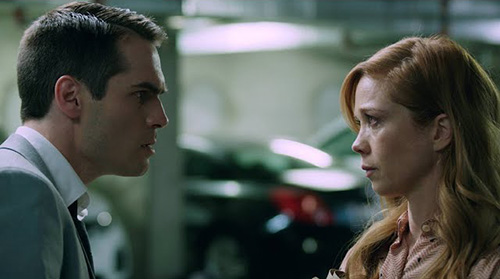
 Look, if you’re gonna play a live-action version of a Dungeons & Dragons-style table game, you gotta do it right, like the med students of Shakma:
Look, if you’re gonna play a live-action version of a Dungeons & Dragons-style table game, you gotta do it right, like the med students of Shakma:
1) Play it in a 10-story building overnight.
2) Give everyone trackers and walkie-talkies, over.
3) Scrawl clues on chalkboards.
4) Put the villain in a Halloween wolf mask.
5) Outfit the princess in head-to-toe “sister wife.”
And for maximum pants-wetting action you can’t even get from a 32-sided die:
6) Let a hyperaggressive baboon with a beet-red ass — and festering resentment for being experimented upon — run amok, over.
The students — The Blue Lagoon’s Christopher Atkins and A Nightmare on Elm Street’s Amanda Wyss among them — don’t exactly “let” the baboon into the game. Neither does their professor, played by Roddy McDowall, despite the advanced familiarity with pissed-off primates he brings to the role. But because Atkins’ character fails to euthanize the animal as instructed, Shakma gets loose and seeks to destroy, dismantle and dismember — preferably all at once.
Shakma is played by Typhoon, whom you’re likely to have seen in the telepods of David Cronenberg’s The Fly. Remember how sweet and sympathetic he was in that sci-fi classic? Well, that monkey has more range than Atkins, because Typhoon is as mean as a nest of murder hornets.
With his unit dangling like an unwrapped string cheese, Shakma hisses, leaps and attacks with convincing fury. Talk about committing to your art, too, because 44 minutes in, the animal bats at a door so forcibly, he rage-poops without the slightest of pauses.
As silly as its title, Shakma seems to be like a slasher movie, but with a monkey in the middle. Although co-directors Hugh Parks and Tom Logan (of the same year’s Dream Trap) botch the movie overall, there’s something to be said about its wild-kingdom premise. Naturally, its death scenes are its finest resource, over. —Rod Lott






 Before I (first) got married in 1994, one of my brothers drunkenly noted I should think about the fact I was “committing to one vagina” for the remainder of my years.
Before I (first) got married in 1994, one of my brothers drunkenly noted I should think about the fact I was “committing to one vagina” for the remainder of my years. 
 Those of us young enough to remember the national conversation around
Those of us young enough to remember the national conversation around 



